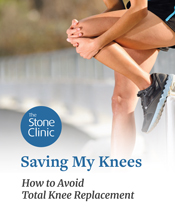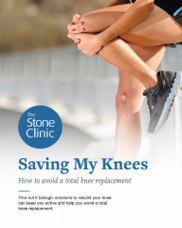Articular cartilage paste graft rehab protocol
General Considerations
- Progression should be based on careful monitoring by the Physical Therapist of the patient’s functional status.
- Patients are cleared to drive once they are off all narcotic pain medications typically around week 2, or if cleared by Physical Therapist.
- Non-weight bearing status for 4 weeks post-op (resting foot on floor and driving are okay).
- No direct palpation to surgical portals for 4 weeks. Consider the edges of the bandages as the “do not touch” zone (approx. 2” in all directions from each surgical portal).
- Push for full extension equal to opposite side.
- Regular manual treatment should be conducted to the patella and soft tissue (except around portals) to decrease the incidence of fibrosis.
- Light to no resistance stationary cycling is okay at 2 weeks post-op (low cadence, low resistance).
- Early restoration of neuromuscular quad control is important.
- No resisted leg extension machines (isotonic or isokinetic) at any point.
- Low impact activities for 3 months post-op.
- Daily 1500 -3000 mg of Glucosamine Sulfate via Joint Juice or other sources.
- *Use of the continuous passive motion machine (CPM) for 6 hours a day for 4 weeks is imperative. Range of motion to be determine by MD based on location of repair.
Week 1
- Nurse visit day 2 post-op to change dressing and review home program.
- Icing and elevation for 15-20 min every 2 hours per icing protocol.
- Continuous passive motion machine (CPM) at home for 6 hours daily/at night.
Manual
- Soft tissue mobilization to quadriceps, posterior musculature, suprapatellar pouch, popliteal fossa, iliotibial band, Hoffa’s fat pads.
- Patellar mobilizations.
- Avoid direction palpation to portals x 4 weeks.
Exercises
- Well-leg stationary cycling (light to no resistance), upper body ergometer.
- Range of motion exercises (passive/active), quadriceps/ gluteal sets, straight leg raises (lying, seated, side-lying and standing), hip/foot/ankle exercises.
- Sit at edge of bed and allow knee to bend to 90 degrees or less for 5 minutes 4x/day in pain-free range.
Goals
- Knee range of motion 0 to 90 degrees.
- Pain <3/10.
- Minimal edema.
- Gait non-weight bearing x 4 weeks.
Weeks 2 - 4
- Nurse visit at 14 days for suture removal and check-up.
Manual
- Continue with soft tissue mobilization to quadriceps, posterior musculature, suprapatellar pouch, popliteal fossa, iliotibial band , Hoffa’s fat pads.
- Manual resisted (PNF patterns) of the foot, ankle and hip; core stabilization.
Exercises
- Non-weightbearing aerobic exercises (i.e. unilateral cycling, upper body ergometer, Schwinn Air-Dyne arms only).
- AFTER 2 weeks, bilateral cycling with light to no resistance, low spin cadence.
Goals
- Knee range of motion 0 to 100 degrees.
- Gait non-weight bearing x 4 weeks.
Weeks 4 - 6
- M.D. visit at 4 weeks post-op, will progress to full weight bearing weaning down to 1 crutch, cane, or no assistive device.
Manual
- Continue with previous soft tissue mobilization, initiation of scar mobilization to closed surgical portals.
Exercises
- Incorporate functional exercises (i.e. squats, lunges, Shuttle/leg press, calf raises, step-ups/lateral step-ups).
- Balance/proprioception exercises.
- Slow to rapid walking on treadmill (preferably a low-impact treadmill).
- Progress knee flexion range of motion.
Goals
- Knee range of motion 0 to 120 degrees.
- Tolerate increased functional exercises/strengthening.
- Gait weight bearing as tolerated work towards good quality gait with least amount of assistive device.
Weeks 6 - 8
- Increase the intensity of functional exercises (i.e. add stretch cord for resistance, increase weight with weightlifting machines).
- Add lateral training exercises (side-stepping, Theraband resisted side-stepping).
Goals
- Patients should be walking without a limp.
- Full active range of motion.
Weeks 8 - 12
- Continue with strengthening; progress balance exercises with emphasis on dynamic tasks.
- Patients should be pursuing a home program with emphasis on sport/activity-specific training.
- Road cycling as tolerated starting in saddle, flat surface; progress cautiously.
Weeks 12+
- Complete Sport Test 1.
- Continue with strengthening, endurance, balance, and sport specific training.
- Increase intensity of low impact type cardio- swimming, cycling, elliptical,etc.
- No high impact activities X 1 year unless approved by MD.
NOTE: All progressions are approximations and should be used as a guideline only. Progression will be based on individual patient presentation, which is assessed throughout the treatment process.

